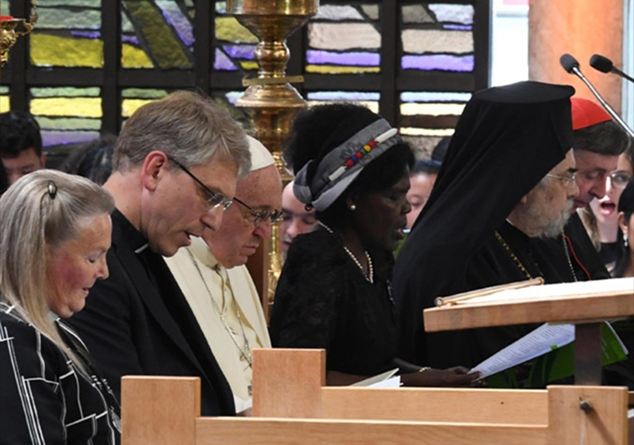
The Ecumenical Council of Churches and the search for peace
"We pray that everyone in Syria can share the conviction that military actions cannot bring just peace to the country. Only political and social dialogue can contribute to the development of principles for living together in dignity and equality, with respect for the rule of law.". Thus, on November 1, 2019, Lutheran Pastor Olav Fyske Tveit, then general secretary of the World Council of Churches, expressed the position of the Ecumenical Council on Syria. He did so on the occasion of one of the many attempts to find a solution to the civil war in a way that reaffirmed how the Ecumenical Council of Churches, which is based in Geneva and aims to further the ecumenical path since its founding in 1948 in Amsterdam, supported materially and spiritually any act that could lead to an end to the war. It was a matter of reviving a position that had guided the Ecumenical Council since the first clashes in Syria, which were to escalate into a war that is now more than a decade old.
Throughout these terrible years of civil war, the Ecumenical Council of Churches has always kept its attention on Syria alive, and through its many interventions, it wanted to remind and manifest that the Council was in the forefront of the search for solutions to begin a path of peace, based on the reconciliation of memories, as the first step for the establishment of justice. The Council called on everyone, not just the churches that are part of the ecumenical body, to denounce violence and work for peace, making numerous calls for initiatives in Syria and around the world. In these initiatives, even when they took on a non-exclusively ecumenical dimension, the Ecumenical Council urged Christians to work, after praying together, since it was precisely in prayer that the light of merciful love could be found to overcome the darkness of pain and death.
Alongside this constant call to prayer, as a privileged way to build a communion capable of fostering increasingly effective Christian action in the realization of peace, the Council has been working with a series of projects with which to try to alleviate suffering and hardship of men and women overwhelmed by war. These projects, as was mentioned on April 21, during a webinar mode conference, were also designed as opportunities to foster interfaith collaboration to help bring about peace. Of course, this is a position taken by the Ecumenical Council of Churches that does not only concern Syria, but also other countries, such as Nigeria, Iraq, and the Palestinian Authority, where the Council has activated projects to combat violence and discrimination in the name of peace. For Syria, the Ecumenical Council's projects have taken on a very special significance precisely because of the dramatic situation created by the duration of the war, which has caused unimaginable material and spiritual damage. Among the disasters denounced by the Ecumenical Council is "violence" over water, that is, the use of water as a weapon of war for a direct attack on men and women who are deprived of the use of water when it is not deliberately polluted to prevent them from having any chance of surviving the war. In denouncing this "violence," the Ecumenical Council recalled the commitment of Christians to safeguarding creation remains central to building a society where violence is banished, all the more so in a time of pandemic. In fact, as has also been said recently, depriving men and women in Syria of water during the pandemic multiplies the possibility of the spread of contagion, increasing the mortality rate, and against this "violence" Christians must raise their voices, finding ways by which in Syria, as in any other country, to prevent the exploitation of creation's resources for war, seeking to involve international institutions, such as the United Nations, as well.
In the year in which we commemorate the 90th anniversary of the passing of Swedish Lutheran Bishop Nathan Söderblom (1866-1931), one of the founders of the contemporary ecumenical movement, who received the Nobel Peace Prize precisely for his commitment to mobilizing the Churches for peace, the Ecumenical Council of Churches shows profound fidelity to a daily commitment to peace as a fundamental element of ecumenical witness, thereby renewing its commitment to the lives of men and women in Syria, all the more so at a time when the fight against the pandemic seems to be widening social differences, posing other question marks about the country's future.
Riccardo Burigana
